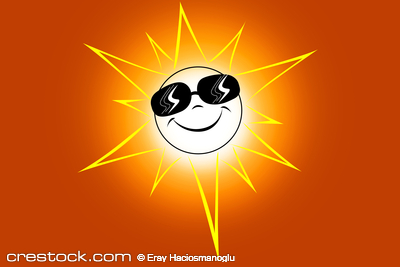
As summer approaches, so does the concern of sun exposure and its potential health risks. Unfortunately, we are bombarded with information that the sun kills thousands of people each year as it is viewed as a dangerous health problem responsible for many deaths via skin cancer. Interestingly enough, as the incidence of skin cancer has increased, so has the increased use of sunscreen, not lack thereof.
The problem with many sunscreens today is that they do not block UVA rays. They block UVB rays, which are harmful, but much less than UVA. And to make matters worse, we humans obtain much of our vitamin D thru UVB rays. Vitamin D has perhaps been one of the most studied nutrients over the past years as findings show its necessity in immune system function. Low vitamin D levels are now shown to be associated with certain auto-immune diseases, particularly multiple sclerosis. And the lack of vitamin D will increase ones risk of skin cancer greatly. Some studies are now linking the use of sunscreen with an increased risk of malignant melanoma (skin cancer). By lathering up in sunscreen, many are blocking the absorption of vitamin D as well as giving themselves a false sense of security as they think they can stay in the sun longer, only to absorb more of the dangerous UVA rays. This double edged sword is killing many. Some sunscreens even contain ingredients such as zinc oxide that repel the sun’s rays in such a way to create free radical damage on the skin. Free radicals are responsible for cellular changes that are linked to certain cancers.
This is not to say that you shouldn’t use sunscreen. If you’re going to be out in the sun for a prolonged time and especially if you burn easily, then you need to use one. But remember that whatever you put on your skin you are going to absorb. So if your sunscreen contains a lot of contaminants, (and many do), as well as hydrogenated oils, (and many do), they will soon be part of you.
Your best protection against the harmful rays of the sun is to get a tan. Don’t burn; that is the worst thing you can do for your skin. Not everyone can tan, but for those who can this is ideal. And for those who can’t, you still need the benefit of the sun so just limit your exposure not to burn. Avoid mid-day sun exposure when the rays are at their brightest, or if you have a problem with exposure any time of the day, then investigating a vitamin D3 supplement may be your best alternative, (see below for more info). 15 to 30 minutes a day of sun exposure, (without sunscreen), is typically sufficient to obtain the necessary amount of vitamin D.
Eating well is not only necessary for a healthy body, but for healthy skin. A diet rich in Omega 3 fats, (fish and flax and most egg yolks), and antioxidants, (fruits, vegetables, herbs), will keep your skin and your health protected. Natural, unrefined wheat germ oil is perhaps the best oil to protect your skin from the sun as well as a great oil to use if you are unfortunate to burn.
**For more information on the link between low sun exposure and health problems, visit SUNARC.
To check ingredients of cosmetics, including sunscreens, visit SKIN DEEP. This is a good site to see what effects certain chemicals may have on your body, but unfortunately it rates products containing hydrogenated oils and even aluminum, as safe. So I wouild not recommend that you simply use products that they rate as healthy. Stick with natural products and use the site’s search feature to check suspect ingredients.
- Get a tan!
- Don’t burn!
- Check your sunscreen’s ingredients!
- Eat healthy fats and antioxidants!
- Have your vitamin D level checked!
- Vitamin D is extremely important in maintaining a healthy immune system. Many people are deficient in the nutrient, especially in the winter months as vitamin D is best derived from the UV-B rays of the sun. Optimal 25(OH)D levels are 50-80 ng/ml.




Leave a Reply